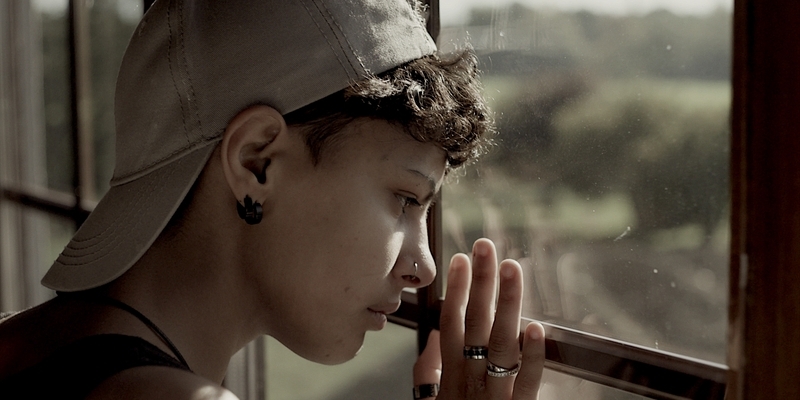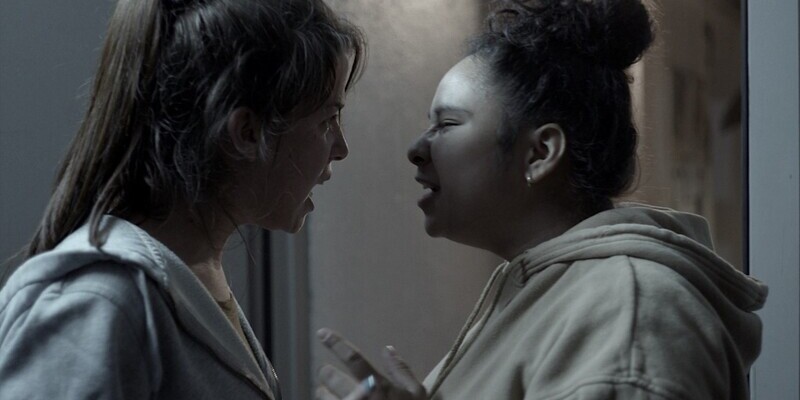
Review by
Benjamin Poole
Directed by: Fred Bailiff
Starring: Claudia Grob, Anaïs Uldry, Kassia Da Costa, Joyce Esther Ndayisenga,
Charlie Areddy, Amélie Tonsi, Amandine Golay, Sara Tulu

As an ex-social worker, Fred Baillif, the writer/director of
La Mif (The Fam), brings a hard-won authenticity to his
portrayal of a girls only children’s home. Although
La Mif is not quite ‘direct cinema’, there is a documentary
rawness to the film’s representation of the Swiss social system, a realism
which is catalysed by Baillif’s use of non-professionals to play the roles
of the care home workers and its residents. Its fractured glass narrative
looks at a transgression within the home from several different points of
view, allowing each of the characters and their various backstories
status, and immersing us in the bleak, compromised world of this sort of
social care.

Nonetheless, regarding La Mif’s cool girl-gang poster and the graphic opening discussion of sex from
its mid teen denizens, this jaded, unimaginative reviewer was positioning
himself for a grimly ribald tableau in the style of Kids or
similar (you know, those godawful films which exploit teen sexuality via a
bogus hipster eye). This inclination was compounded when one of the girls,
the 16 year old Audrey (Anaïs Uldry) is caught having sex with a 14
year old boy early in the film. Unlike the nihilistic portrayals of the TV
show Euphoria, say, this incident is however not simply part and parcel of a wider
incoming bricolage of teens behaving badly: the event is immediately taken
seriously by the social workers and has far reaching consequences for all
characters, along with the home itself. La Mif views its
young protagonists as vulnerable children, not glamorised ravers.
Reassuringly, Bailliff is a filmmaker whose care for and responsibilities
towards these damaged teens is visible in every frame.

As we see aspects of the event, a statutory rape, play out from different
perspectives, our focal point is Lora (Claudia Grob), who is the
manager of the home. Lora is a constant for both the girls and the
audience, featuring prominently throughout each of the girl’s stories. Her
demanding role is to balance care with authority, and
La Mif soberly poses the sort of difficult questions which
the care system must deal with every day: how far is Audrey culpable, what
is the effect on the boy, in what ways can all parties move forward? (This
system is the de facto place where the buck stops, after all).
When we are party to the board meetings that the workers have,
Joseph Areddy’s camera is static and removed, soberly presenting
the necessarily bureaucratic response to highly emotive situations.
However, in a way which creates empathy with the residents of the home,
when he films the teens the lens is intuitive. Here the camera whips and
tilts, cutting closer and rapidly transitioning between conversations,
creating an infectiously kinetic energy. The girls are filmed swimming,
running, dancing - figures of burning adolescent excitements. In one
instructive sequence we crosscut between a couple of girls stealing a
homeless man’s trolley and running off with it for a laugh, while the
management team of the home sit around a table discussing how best to
administer care and discipline: it must be like herding cats.

As certain quarters of mass entertainment cavalierly exploit the
tribulations of teen life, and the complex mechanisms of social care are
so often simplistically adapted within drama, with its striking
verisimilitude, La Mif is an important film. At times, it
can be a frustrating watch, with the plot circulating repeatedly back to
the inciting incident. But this narrative approach in itself is mimetic of
Lora’s Sisyphean role; the two steps forward, one step back challenges of
developing troubled teens and dealing with their wider contexts. As the
uncomfortably prolonged last shot suggests, there are no easy solutions
and the future for these kids is anyone’s guess.

La Mif is in UK cinemas from
February 25th.

